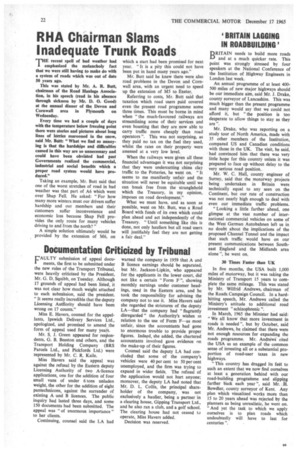BRITAIN LAGGING IN ROADBUILDING '
Page 24

If you've noticed an error in this article please click here to report it so we can fix it.
BRITAIN needs to build more roads and at a much quicker rate, This point was strongly stressed by four speakers at the National Conference of the Institution of Highway Engineers in London last week.
An annual programme of at least 400500 miles of new major highways should be our immediate aim, said Mr. J. Drake, county surveyor of Lancashire. This was much bigger than the present programme and many would say that we could not afford it, but "the position is too desperate to allow things to stay as they are ".
Mr. Drake, who was reporting on a study tour of North America. made with 35 other members of the Institution, compared US and Canadian conditions with those in the UK. The visit, he said, had convinced him that there was very little hope for this country unless it was prepared to face up without delay to the very serious road position.
Mr. W. C. Hall, county engineer of Surrey. said that the motorway projects being undertaken in Britain were technically equal to any seen on the Continent, but our rate of construction was not nearly high enough to deal with even our immediate traffic problems.
"Looking a little farther ahead, one glimpse at the vast number of international commercial vehicles on some of the West German Autobahnen left us in no doubt about the implications of the proposed Channel Tunnel and the impact that such traffic would have on our present communications between Southeast England and the Midlands area alone he went on.
30 Times Faster than UK In five months, the USA built 1,000 miles of motorway, but it was taking the Ministry of Transport 15 years to complete the same mileage. This was stated by Mr. Wilfrid Andrews, chairman of the Roads Campaign Council. In a hardhitting speech, Mr. Andrews called the Ministry's attitude to additional road investment " schizophrenic ".
In March, 1965 the Minister had said: "We all know that more investment in roads is needed ", but by October, said Mr. Andrews, he claimed that there were not enough resources for expanding the roads programme. Mr. Andrews cited the USA as an example of the common sense of investing all or a substantial proportion of road-user taxes in new highways.
" This country has dragged its feet to such an extent that we now find ourselves at least a generation behind with our road-building programme and slipping farther back each year ". said Mr. H. Bowdler, county surveyor of Kent. Any plan which visualized works more than 15 to 20 years ahead was rejected by the planners as being unrealistic, he went on. "And yet the task to which we apply ourselves is to plan roads which undoubtedly will have to last for centuries ".












































































































